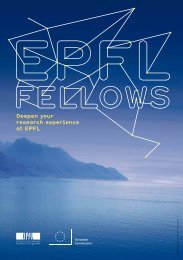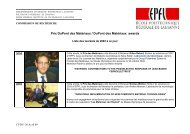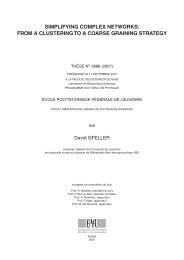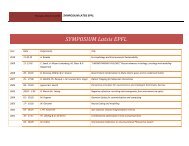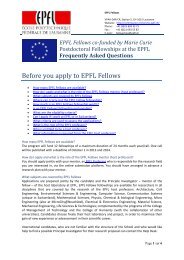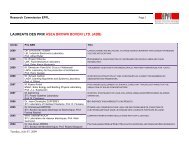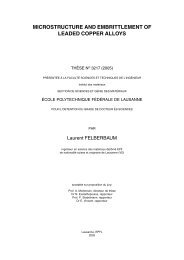Prix de la Fondation Dimitris N. Chorafas / « Fondation Dimitris N ...
Prix de la Fondation Dimitris N. Chorafas / « Fondation Dimitris N ...
Prix de la Fondation Dimitris N. Chorafas / « Fondation Dimitris N ...
Create successful ePaper yourself
Turn your PDF publications into a flip-book with our unique Google optimized e-Paper software.
EIDGENÖSSISCHE TECHNISCHE HOCHSCHULE LAUSANNE<br />
POLITECNICO FEDERALE DI LOSANNA<br />
SWISS FEDERAL INSTITUTE OF TECHNOLOGY LAUSANNE<br />
COMMISSION DE RECHERCHE<br />
<strong>Prix</strong> <strong>de</strong> <strong>la</strong> <strong>Fondation</strong> <strong>Dimitris</strong> N. <strong>Chorafas</strong> / « <strong>Fondation</strong> <strong>Dimitris</strong> N. <strong>Chorafas</strong> » award<br />
2001 Lebrun Jérôme SSC Prof. M. Vetterli Ba<strong>la</strong>ncing MultiWavelets A central problem in communication systems is the compression of<br />
information signals so that higher efficiencies can be obtained in its<br />
transmission and storage. Recently, wavelets have had an important<br />
impact on compression, becoming part of new compression<br />
standards. But many questions remain open, for example when<br />
<strong>de</strong>aling with multi-dimensional signals such as images or vi<strong>de</strong>o.<br />
Such signals are more complex in nature and consequently their<br />
compression is less well un<strong>de</strong>rstood. One important new<br />
construction, called multiwavelets, overcomes several of the<br />
limitations of c<strong>la</strong>ssical wavelets. This thesis has given a complete<br />
characterization of this new set, leading to original constructions that<br />
open up a new realm in the compression of complex information<br />
signals.<br />
2001 Lütolf Christine SMA Prof. T. Liebling Mo<strong>de</strong>ling and optimizing energy<br />
production in a stochastic<br />
environment: from aggregate<br />
mid term p<strong>la</strong>nning to on-line<br />
scheduling<br />
Une <strong>de</strong>s tâches principales <strong>de</strong>s managers aujourd’hui est celle <strong>de</strong><br />
déci<strong>de</strong>r. Dans un mon<strong>de</strong> en évolution très rapi<strong>de</strong> et dans lequel <strong>la</strong><br />
globalisation <strong>de</strong> l’économie et <strong>de</strong> <strong>la</strong> politique est <strong>de</strong> règle, une erreur<br />
peut avoir <strong>de</strong>s conséquences dramatiques pour un nombre<br />
croissant <strong>de</strong> personnes. La production d’énergie est une <strong>de</strong>s<br />
activités humaines les plus importantes <strong>de</strong> notre civilisation et il est<br />
crucial <strong>de</strong> <strong>la</strong> p<strong>la</strong>nifier intelligemment si l’on veut bâtir un mon<strong>de</strong><br />
durable. Il est donc absolument nécessaire que <strong>de</strong>s outils d’ai<strong>de</strong> à <strong>la</strong><br />
décision bien étudiés et efficaces soient à <strong>la</strong> disposition <strong>de</strong>s<br />
déci<strong>de</strong>urs tant économiques que politiques.<br />
Laudatio<br />
(suite)<br />
Dr. Christine Lütolf a développé un modèle applicable à <strong>la</strong> production énergétique qui a été remarqué par le jury <strong>de</strong> thèse à cause <strong>de</strong> sa qualité scientifique exceptionnelle.<br />
On soulignera <strong>la</strong> gran<strong>de</strong> créativité déployée par Mlle Lütolf tant dans <strong>la</strong> modélisation proprement dite que dans <strong>la</strong> conception et <strong>la</strong> réalisation algorithmique <strong>de</strong>s métho<strong>de</strong>s<br />
qu’elle a imaginées. Etabli à partir du cas concret <strong>de</strong> <strong>la</strong> production et <strong>de</strong> <strong>la</strong> distribution d’énergie électrique, le modèle développe <strong>de</strong>s principes applicables à d’autres<br />
situations. A ce<strong>la</strong> s’ajoute le volet non moins important <strong>de</strong> l’application directe du travail au domaine du développement durable. Ce fait est d’autant plus remarquable que<br />
les sciences <strong>de</strong> base, telle <strong>la</strong> mathématique, ne sont malheureusement que rarement impliquées dans <strong>de</strong>s dimensions interdisciplinaires relevant à <strong>la</strong> fois <strong>de</strong> l’économie,<br />
<strong>de</strong> <strong>la</strong> société et <strong>de</strong>s sciences, et en particulier <strong>de</strong> l‘environnement. Mlle Lütolf a montré <strong>de</strong> façon magistrale que cette nouvelle approche du chercheur face à sa<br />
responsabilité sociétale est tout à fait possible.<br />
CVDV/Monday, July 18, 2011 page 5



